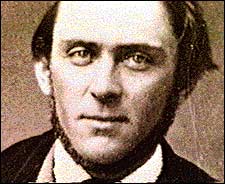Samuel Brannan 
(1819-1889)
An early apostle of the power
of publicity, Samuel Brannan enjoyed spectacular success in
capitalizing on the California gold rush in what was to prove a
dramatic and tumultuous life.
Born in Maine in 1819, at age
fourteen he moved to Ohio with his family. He completed his
printer's apprenticeship in 1836, and spent the next five years
moving from state to state as a journeyman printer. Brannan
converted to Mormonism in 1842 and subsequently moved to New
York City to help publish several Mormon newspapers.
In November of 1845 a large
group of New York City Mormons decided to seek refuge in
California, then formally a Mexican territory. Brannan led the
expedition of over two hundred people, which travelled by boat
around South America and to the Hawaiian Islands. Their 1846
arrival in San Francisco (then called Yerba Buena) immediately
tripled the city's tiny population.
After a brief period as
publisher of a San Francisco newspaper, Brannan moved to John
Sutter's settlement on the Sacramento and American Rivers and
soon established a general store. The Mormon church claimed that
he had diverted the money to this commercial enterprise, and
expelled Brannan when he refused to return it. ("I'll give the
Lord his money when I get a receipt signed by the Lord," Brannan
is alleged to have said.) When James Marshall discovered gold on
Sutter's land in 1848, Brannan seized the opportunity by widely
publicizing the discovery and then selling his goods to the
flood of men who came in search of gold.
Within several years,
Brannan's meteoric commercial success had made him California's
first millionaire. In 1849 he returned to San Francisco, where
he continued his business activity, was elected to the City
Council, and played a leading role in organizing the
controversial Committee of Vigilance, which served as a
citizen's police force. Throughout the 1850's his wealth and
influence continued to grow; he became a major California
landowner and helped to establish several banks and railroad and
telegraph companies. Serious alcoholism and a volatile
temperament, however, were his eventual undoing. He lost his
fortune and health, as did many of those who first benefitted
from the gold rush, and died an unnoticed death in rural San
Diego county. |